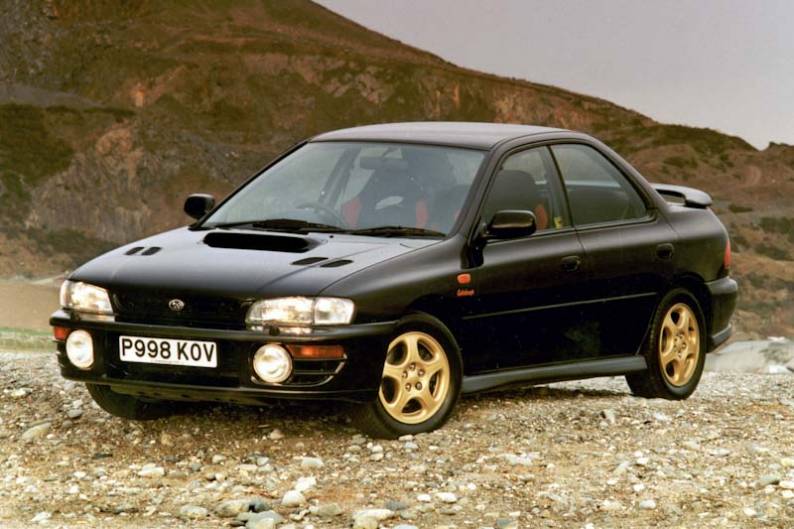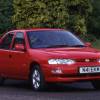
RAC sale – up to 33% off*
• Roadside cover from £5.29 a month†
• We get to most breakdowns in 60 mins or less
• Our patrols fix 4/5 breakdowns on the spot

BY JONATHAN CROUCH
Introduction
The Subaru Impreza used to be something of an under-rated car. It's not the case on the international rally scene of course. In the showroom however, things were a little different.
Sales got off to a slow start in 1993 and didn't pick up much until the rally successes began making the headlines. Today, however, buyers rate the medium-sized Subaru, placing it high in the JD Power/Top Gear Customer Satisfaction Surveys. These people reckon it's a great buy; check one out and you'll probably agree.
Models
Models Covered:
4 door saloon, 5 door hatchback: 1.6, 1.8, 2.0, 2.0 turbo [LX, GL, Sport, 4wd Turbo, 22B, Terzo, P1])
History
The Impreza was introduced in May 1993, with 1.8-litre power and the choice of a bland-looking saloon or an innovative five-door hatch-cum-small estate, both offered in GL form with standard four-wheel drive. A two-wheel drive 1.6-litre model was added later that year and also offered in cheaper LX guise.
More significantly, the superb four-wheel drive 2.0-litre turbo version was launched in May 1994, the roadgoing version of the rally car - though faster variants were offered in Japan. This was an instant hit.
In December 1995, 2.0-litre models were announced as the 1.8 and 1.6-litre variants were gradually phased out. All Imprezas were now four-wheel drive. A popular Sport model was added in March 1996 to bridge the gap between the GL and the 2000 Turbo 4wd. It performed like a GL but looked like a Turbo.
Cosmetic changes were made to the 2000 Turbo 4wd in both 1997 and 1998, the latter year bringing more power, better seats and white instrument dials. There's also a rare British-developed two-door called the P1, introduced early in 2000.
If you're searching for a used Turbo model, you'll find lots of 'grey imported' examples, usually in more powerful WRX or STi guises. These are desirable - and likely to be well priced - but, as ever, grey imports can be a minefield for the uninitiated, so make so that you know exactly what you're buying.
Winter 2000 saw the launch of an all-new Impreza range. Whilst the looks took some getting used to, Subaru managed to hit the target with the driving dynamics. The range consisted of the 95bhp 1.6-litre TS five-door sports wagon, the 125bhp 2.0 GX sports wagon and four-door saloon, and the 218bhp WRX saloon and sports wagon. The range was added to in late 2001 when the 'official' Euro-spec WRX STi model arrived, available with or without a Prodrive body kit and boasting no less than 265bhp.
What You Get
A reliable, fun to drive family alternative. The only real drawback to ownership is the awful interior, a sea of cheap-looking plastic. The tweed-effect seat trim doesn't help either; it all reminds you of a car worth a lot less.
But there are many compensations. The four-wheel drive system fitted to most examples is chief amongst them of course, put to best use in the 2000 Turbo 4wd - a future classic.
Choose the five-door over the saloon but don't expect any more space than in any ordinary Escort-sized hatch.
What You Pay
Please fill in the form here for an exact up-to-date information.
What to Look For
Thrashed 2000 Turbo 4wd models; a service history is essential and air conditioning desirable; watch for accident damage, resprays, kerbed alloys, spongy brakes and worn clutches. Parts are expensive, so tread carefully.
It's a very different story with non-turbo Imprezas, nearly all of which will have been looked after lovingly. Steer clear of two-wheel-drive versions and models tricked up to look like Turbo versions if you can. You lose much of the car's raison d'etre.
Replacement Parts
(2.0 GL approx.) These are pricey. A clutch assembly is around £175. Front brake pads are around £80, a full exhaust about £360, a catalyst about £200 and an alternator (exchange) around £180 or £405 new. A headlamp is about £170.
On the Road
All the engines are reasonably peppy, even the 88bhp 1.6 and the 101bhp 1.8. The 2.0-litre units are the ones to go for, however, with the GL and Sport models getting 113bhp and the 2000 Turbo 4wd boasting a massive 208bhp.
In the case of the Turbo, that means rest to 60 in 5.8 seconds and a maximum speed of 137mph; hard to beat in more ways than one. All of which means that this Impreza has the power to leave an Escort Cosworth or a Lancia Delta Integrale (both substantially more expensive and now hard to find) trailing in its wake.
A split second after turning the key, you know that this car isn't bluffing. The free-revving engine possesses a gruff, coarse voice which says you'd better believe those awesome performance figures. A well-developed all-wheel drive system means that you won't spin much of it uselessly away on the tarmac either.
In fact, that all-round grip is one of the main reasons that this Impreza feels so easy to drive in the most horrendous of conditions. It does hop about a little on bumpy country roads, but never enough to leave you in doubt that you're likely to run out of cornering nerve long before the car will.
There is a penalty to all this performance, however - and predictably, it's in the area of fuel consumption. You'll do well to average more than about 19mpg in the Turbo if you use the car hard and even on a run; the figure won't rise much above 27mpg.
Never mind; there's plenty of standard equipment to take your mind off the fact. A driver's airbag, electric windows, power mirrors and central locking all come within the price of every Impreza. If only comprehensive insurance did too (group 17 on the turbo).
Overall
Find me an owner who doesn't want another. Enough said...







